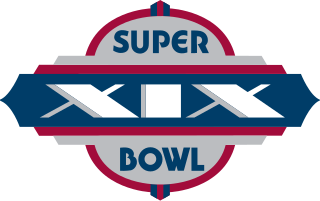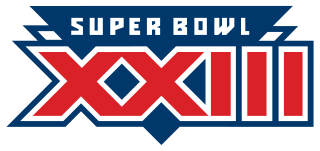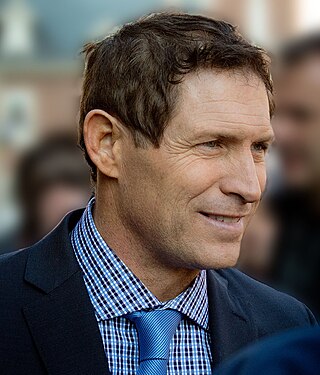
Super Bowl XVI was an American football game between the National Football Conference (NFC) champion San Francisco 49ers and the American Football Conference (AFC) champion Cincinnati Bengals to decide the National Football League (NFL) champion for the 1981 season. The 49ers defeated the Bengals by the score of 26–21 to win their first Super Bowl.

Super Bowl XIX was an American football game between the American Football Conference (AFC) champion Miami Dolphins and the National Football Conference (NFC) champion San Francisco 49ers to decide the National Football League (NFL) champion for the 1984 season. The 49ers defeated the Dolphins by the score of 38–16, to win their second Super Bowl. The game was played on January 20, 1985, at Stanford Stadium, on the campus of Stanford University in Stanford, California, the first Super Bowl played in the San Francisco Bay Area. This also became the second Super Bowl after Super Bowl XIV where the game was coincidentally played in the home market of one of the participants.

Super Bowl XXIII was an American football game between the American Football Conference (AFC) champion Cincinnati Bengals and the National Football Conference (NFC) champion San Francisco 49ers to decide the National Football League (NFL) champion for the 1988 season. The 49ers defeated the Bengals 20–16, winning their third Super Bowl. The game was played on January 22, 1989, at Joe Robbie Stadium in Miami. This was the first Super Bowl hosted in the Miami area in 10 years, and the first in Miami not held at the Orange Bowl.

Super Bowl XXIV was an American football game between the National Football Conference (NFC) champion San Francisco 49ers and the American Football Conference (AFC) champion Denver Broncos to decide the National Football League (NFL) champion for the 1989 season. The game was played on January 28, 1990, at the Louisiana Superdome in New Orleans, Louisiana. The 49ers defeated the Broncos by the score of 55–10, winning their second consecutive Super Bowl, and then-tying the Pittsburgh Steelers with four Super Bowl victories. San Francisco also became the first team to win back-to-back Super Bowls with two different head coaches; rookie head coach George Seifert took over after Bill Walsh retired following the previous season's Super Bowl.

Super Bowl XXIX was an American football game between the American Football Conference (AFC) champion San Diego Chargers and the National Football Conference (NFC) champion San Francisco 49ers to decide the National Football League (NFL) champion for the 1994 season. The 49ers defeated the Chargers by the score of 49–26, becoming the first team to win five Super Bowl championships. The game was played on January 29, 1995, at Joe Robbie Stadium in Miami, Florida. In turn, this was the first Super Bowl to be played in that area after Hurricane Andrew ravaged the city in 1992.

Joseph Clifford Montana Jr. is an American former football quarterback who played in the National Football League (NFL) for 16 seasons, primarily with the San Francisco 49ers. Nicknamed "Joe Cool" and "the Comeback Kid", Montana is widely regarded as one of the greatest quarterbacks of all time. After winning a national championship at Notre Dame, Montana began his NFL career in 1979 at San Francisco, where he played for the next 14 seasons. With the 49ers, Montana started and won four Super Bowls and was the first player to be named the Super Bowl Most Valuable Player (MVP) three times. He also holds Super Bowl career records for most passes without an interception and the all-time highest passer rating of 127.8. In 1993, Montana was traded to the Kansas City Chiefs, where he played for his last two seasons and led the franchise to its first AFC Championship Game. Montana was inducted to the Pro Football Hall of Fame in 2000.

Jon Steven Young is an American former football quarterback who played in the National Football League (NFL) for 15 seasons, most notably with the San Francisco 49ers. He was drafted by and played for the Tampa Bay Buccaneers. Prior to his NFL career, Young was a member of the Los Angeles Express in the United States Football League (USFL) for two seasons. He played college football for the BYU Cougars, setting school and NCAA records en route to being runner-up for the 1983 Heisman Trophy.

Jerry Lee Rice is an American former professional football player who was a wide receiver for 20 seasons in the National Football League (NFL). He won three Super Bowl titles with the San Francisco 49ers before two shorter stints at the end of his career with the Oakland Raiders and Seattle Seahawks. Nicknamed "World" because of his superb catching ability, his accomplishments and numerous records, Rice is widely regarded as the greatest wide receiver of all time and one of the greatest players in NFL history. His biography on the official Pro Football Hall of Fame website names him "the most prolific wide receiver in NFL history with staggering career totals". In 1999, The Sporting News listed Rice second behind Jim Brown on its list of "Football's 100 Greatest Players". In 2010, he was chosen by NFL Network's NFL Films production The Top 100: NFL's Greatest Players as the greatest player in NFL history.
The 1996 season was the Green Bay Packers' 76th season in the National Football League (NFL), their 78th overall and their fifth under head coach Mike Holmgren. The franchise won its third Super Bowl and league-record 12th NFL Championship. The Packers posted a league-best 13–3 regular season win-loss record, going 8–0 at home and 5–3 on the road. It was the first time since 1962 that the team went undefeated at home. Additionally, the Packers had the NFL's highest-scoring offense (456) and allowed the fewest points on defense (210). Green Bay was the first team to accomplish both feats in the same season since the undefeated 1972 Miami Dolphins. They finished the season with the number one ranked offense, defense, and special teams. They also set a then NFL record for the fewest touchdowns allowed in a 16-game season, with 19. The Packers also allowed the fewest yards in the NFL and set a record for punt return yardage. Brett Favre won his second straight MVP award while also throwing for a career-high and league-leading 39 touchdown passes.
The 1989 Green Bay Packers season was their 71st overall and their 69th in the National Football League. The Packers finished with a 10–6 record, their best since 1972, but failed to make the playoffs. The team was often referred to as "The Cardiac Pack" due to several close-game wins. The 1989 Packers hold the NFL record for most one-point victories in a season with four. The team was coached by Lindy Infante and led by quarterback Don Majkowski, who attained his nickname "The Majik Man."

The 1994 season was the San Francisco 49ers' 45th in the National Football League (NFL), their 49th overall, and their sixth under head coach George Seifert. This season was highlighted by a victory in Super Bowl XXIX. The championship made San Francisco the first team to win five Super Bowls. After losing to the Dallas Cowboys in the previous two conference championship games, the 49ers made significant acquisitions in the 1994 free agent market. This included the signing of two-sport star Deion Sanders and Cowboys linebacker Ken Norton, Jr. Sanders had a major impact on the team's success, winning the NFL Defensive Player of the Year Award and recording six interceptions. The 49ers won their division, the NFC West, for the eighth time in nine seasons.

The 1989 season was the San Francisco 49ers' 40th in the National Football League (NFL), their 44th overall and their 1st season under head coach George Seifert. After going 14–2 in the regular season, the 49ers completed the season with one of the most dominant playoff runs of all time, outscoring opponents 126–26, earning their fourth Super Bowl victory and their second consecutive, where they defeated the Broncos, 55–10. They finished with the best record in the NFL for the first time since 1987. Their two losses were by a combined 5 points.

The 1990 San Francisco 49ers season was the franchise's 41st season in the National Football League (NFL) and their 45th overall. the team entered the 1990 season heavily favored to win their third consecutive Super Bowl. The season was highlighted by their victory over the New York Giants on Monday Night Football in Week 13. Throughout the season, the 49ers and the Giants were the two best teams in the NFL and they met again in the NFC Championship Game.

The 2000 San Francisco 49ers season was the franchise's 51st season in the National Football League (NFL) and their 55th overall. Jerry Rice entered the 2000 season as the oldest player in the league at the wide receiver position. At the end of the year, however, with the emergence of Terrell Owens, Rice decided to leave the team after sixteen seasons to join the Raiders. Running back Charlie Garner would join Rice in Oakland.

The 1997 San Francisco 49ers season was the franchise's 48th season in the National Football League (NFL) and their 52nd overall. The team appeared in the NFC Championship Game for the fifth time in the 1990s. This season marked the 49ers' last appearance in the NFC title game until the 2011 season as well as the last time that they clinched the number 1 seed with home-field advantage throughout the playoffs until the 2019 season. The team's playoff run was ended by the Green Bay Packers for the third straight season.

The 1996 San Francisco 49ers season was the club's 51st since its inception. In commemoration, the 49ers wore a special 50th anniversary patch. They also wore a new uniform reminiscent of the 1994 throwback uniforms with white pants and shadowed numbers, but with a darker shade of red and an updated logo. The franchise tied for first place in the NFC West with a 12–4 record, but lost the division title to the Carolina Panthers on the division-record tiebreaker. The 49ers ranked 3rd in the league in points scored and 4th in fewest points allowed.

The 1995 San Francisco 49ers season was the franchise's 46th season in the National Football League (NFL) and their 50th overall.

The 1992 San Francisco 49ers season was the franchise's 43rd season in the National Football League (NFL) and their 47th overall. The 49ers appeared in the NFC Championship Game for the second time in three seasons. This was the last season the 49ers had Joe Montana on the roster. The last game he played as a 49er was the December 28 Monday Night Football game against the Detroit Lions.
The 1988 Cincinnati Bengals season was the team's 21st year in professional football and its 19th with the National Football League (NFL).









